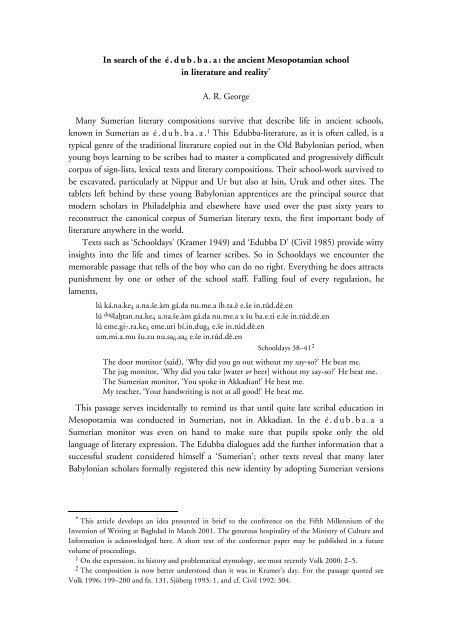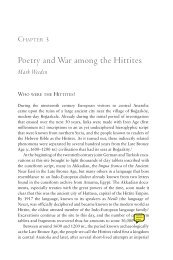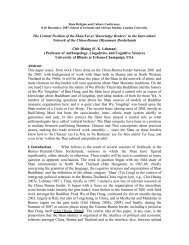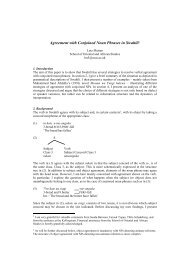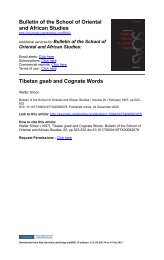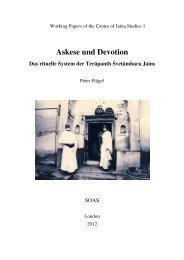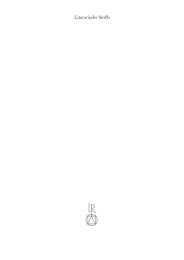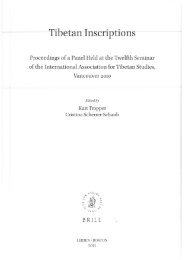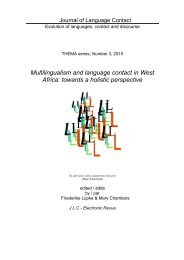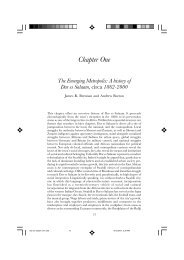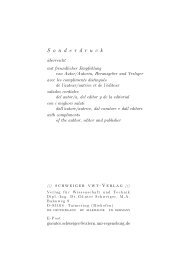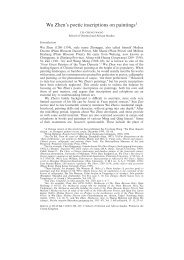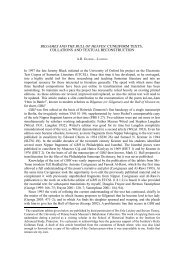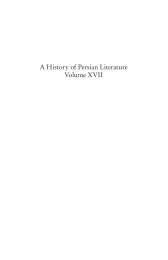In search of the é . d u b . b a . a : the ancient Mesopotamian school ...
In search of the é . d u b . b a . a : the ancient Mesopotamian school ...
In search of the é . d u b . b a . a : the ancient Mesopotamian school ...
You also want an ePaper? Increase the reach of your titles
YUMPU automatically turns print PDFs into web optimized ePapers that Google loves.
<strong>In</strong> <strong>search</strong> <strong>of</strong> <strong>the</strong> <strong>é</strong> . d u b . b a . a : <strong>the</strong> <strong>ancient</strong> <strong>Mesopotamian</strong> <strong>school</strong><br />
in literature and reality *<br />
A. R. George<br />
Many Sumerian literary compositions survive that describe life in <strong>ancient</strong> <strong>school</strong>s,<br />
known in Sumerian as <strong>é</strong> . d u b . b a . a . 1 This Edubba-literature, as it is <strong>of</strong>ten called, is a<br />
typical genre <strong>of</strong> <strong>the</strong> traditional literature copied out in <strong>the</strong> Old Babylonian period, when<br />
young boys learning to be scribes had to master a complicated and progressively difficult<br />
corpus <strong>of</strong> sign-lists, lexical texts and literary compositions. Their <strong>school</strong>-work survived to<br />
be excavated, particularly at Nippur and Ur but also at Isin, Uruk and o<strong>the</strong>r sites. The<br />
tablets left behind by <strong>the</strong>se young Babylonian apprentices are <strong>the</strong> principal source that<br />
modern scholars in Philadelphia and elsewhere have used over <strong>the</strong> past sixty years to<br />
reconstruct <strong>the</strong> canonical corpus <strong>of</strong> Sumerian literary texts, <strong>the</strong> first important body <strong>of</strong><br />
literature anywhere in <strong>the</strong> world.<br />
Texts such as ‘Schooldays’ (Kramer 1949) and ‘Edubba D’ (Civil 1985) provide witty<br />
insights into <strong>the</strong> life and times <strong>of</strong> learner scribes. So in Schooldays we encounter <strong>the</strong><br />
memorable passage that tells <strong>of</strong> <strong>the</strong> boy who can do no right. Everything he does attracts<br />
punishment by one or o<strong>the</strong>r <strong>of</strong> <strong>the</strong> <strong>school</strong> staff. Falling foul <strong>of</strong> every regulation, he<br />
laments,<br />
lú ká.na.ke4 a.na.·e.àm gá.da nu.me.a íb.ta.è e.·e in.túd.dè.en<br />
lú dug la¿tan.na.ke4 a.na.·e.àm gá.da nu.me.a x ·u ba.e.ti e.·e in.túd.dè.en<br />
lú eme.gi7.ra.ke4 eme.uri bí.in.dug4 e.·e in.túd.dè.en<br />
um.mi.a.mu ·u.zu nu.sa6.sa6 e.·e in.túd.dè.en<br />
Schooldays 38–41 2<br />
The door monitor (said), ‘Why did you go out without my say-so?’ He beat me.<br />
The jug monitor, ‘Why did you take [water or beer] without my say-so?’ He beat me.<br />
The Sumerian monitor, ‘You spoke in Akkadian!’ He beat me.<br />
My teacher, ‘Your handwriting is not at all good!’ He beat me.<br />
This passage serves incidentally to remind us that until quite late scribal education in<br />
Mesopotamia was conducted in Sumerian, not in Akkadian. <strong>In</strong> <strong>the</strong> <strong>é</strong> . d u b . b a . a a<br />
Sumerian monitor was even on hand to make sure that pupils spoke only <strong>the</strong> old<br />
language <strong>of</strong> literary expression. The Edubba dialogues add <strong>the</strong> fur<strong>the</strong>r information that a<br />
successful student considered himself a ‘Sumerian’; o<strong>the</strong>r texts reveal that many later<br />
Babylonian scholars formally registered this new identity by adopting Sumerian versions<br />
* This article develops an idea presented in brief to <strong>the</strong> conference on <strong>the</strong> Fifth Millennium <strong>of</strong> <strong>the</strong><br />
<strong>In</strong>vention <strong>of</strong> Writing at Baghdad in March 2001. The generous hospitality <strong>of</strong> <strong>the</strong> Ministry <strong>of</strong> Culture and<br />
<strong>In</strong>formation is acknowledged here. A short text <strong>of</strong> <strong>the</strong> conference paper may be published in a future<br />
volume <strong>of</strong> proceedings.<br />
1 On <strong>the</strong> expression, its history and problematical etymology, see most recently Volk 2000: 2–5.<br />
2 The composition is now better understood than it was in Kramer’s day. For <strong>the</strong> passage quoted see<br />
Volk 1996: 199–200 and fn. 131, Sjöberg 1993: 1, and cf. Civil 1992: 304.
George/2<br />
<strong>of</strong> <strong>the</strong>ir names. 3 Even in <strong>the</strong> Parthian period scribal families originally from Nippur were<br />
still adopting <strong>the</strong> pretence <strong>of</strong> Sumerian descent (Oelsner 1982, George 1991: 162).<br />
By <strong>the</strong> Old Babylonian period, if not earlier, Sumerian had long died out among <strong>the</strong><br />
people as a spoken language, but it was still much in use as a written language.<br />
<strong>Mesopotamian</strong> culture was famously conservative and since Sumerian had been <strong>the</strong><br />
language <strong>of</strong> <strong>the</strong> first writing, more than a thousand years before, it remained <strong>the</strong> principal<br />
language <strong>of</strong> writing in <strong>the</strong> early second millennium. A much greater volume <strong>of</strong><br />
documentation was written in <strong>the</strong> Babylonian dialect <strong>of</strong> Akkadian, but Sumerian<br />
retained a particular prestige. Its primacy as <strong>the</strong> language <strong>of</strong> learning was enshrined in <strong>the</strong><br />
curriculum that had to be mastered by <strong>the</strong> student scribe. <strong>In</strong> order to learn how to use<br />
<strong>the</strong> cuneiform script, even to write Akkadian, <strong>the</strong> student traditionally had to learn<br />
Sumerian, for, as <strong>the</strong> proverb said, d u b . s a r e m e . g i r15 n u . m u . u n . z u . a<br />
a . n a . à m d u b . s a r e . n e ‘A scribe who knows no Sumerian, what sort <strong>of</strong> scribe is<br />
he?’ (Proverb Collection 2 no. 47, ed. Alster 1997: 54). To prove he had mastered <strong>the</strong> art<br />
<strong>of</strong> writing and <strong>the</strong> traditions that went with it, <strong>the</strong> would-be scribe copied out, on<br />
dictation and from memory, texts in Sumerian. The most advanced Sumerian texts that<br />
he had to master were a prescribed corpus <strong>of</strong> traditional Sumerian literary compositions. 4<br />
Then as now even <strong>the</strong> best students, it seems, had to be reminded that <strong>the</strong>y were only<br />
novices. So, in Edubba D a boy nearing <strong>the</strong> completion <strong>of</strong> his studies in <strong>the</strong><br />
<strong>é</strong> . d u b . b a . a proudly announces how good he is at his work. Like any o<strong>the</strong>r youngster,<br />
he thinks he knows it all:<br />
nam.dub.sar.mu mu.ub.zu.zu<br />
níg.na.me nu.mu.·i.ib.sìr.re.en<br />
um.mi.a.mu gu.sum di·.àm mu.un.pàd.de<br />
g<strong>é</strong>·tug.mu.ta di· min bí.ib.da¿.e.en<br />
ki.ulutin.mu.u· a.ba.da.tu·.ù.nam<br />
eme.gir15 nam.dub.sar ·à.dub.ba ·id níg.kas7 mu.da.ab.sá.sá.e.en<br />
eme.gir15.ta inim mu.da.ab.bal.e.en<br />
¿<strong>é</strong>.eb.da.gál eme.gir15 i.ri.dul.la.a·<br />
Edubba D 32–8, ed. Civil, M<strong>é</strong>langes Birot, p. 70<br />
I really know my scribal knowledge,<br />
I don’t get stuck at anything!<br />
My teacher shows me a certain sign,<br />
I add one or two more from memory!<br />
Now I’ve been here for <strong>the</strong> stipulated time<br />
I can cope with Sumerian, scribal work, archiving, accounting, calculation!<br />
I can even hold a conversation in Sumerian!<br />
The boy’s interlocutor is some one senior to him who has heard this kind <strong>of</strong> boasting<br />
before. He is quick to put <strong>the</strong> young upstart down. ‘If that is so’, he responds drily,<br />
‘Sumerian must be keeping its secrets from you . . .’<br />
3 See Landsberger 1958: 96. On Sumerian versions <strong>of</strong> scholars’ names see fur<strong>the</strong>r Lambert 1957: 6–7,<br />
George 1993: 63–4.<br />
4 On <strong>the</strong> scribal curriculum <strong>of</strong> <strong>the</strong> Edubba see Sjöberg 1976, Tinney 1998, 1999 and fur<strong>the</strong>r literature<br />
<strong>the</strong>re cited.
George/3<br />
Schooldays, Edubba D and o<strong>the</strong>r examples <strong>of</strong> Edubba-literature, some <strong>of</strong> <strong>the</strong>m later<br />
provided with Akkadian translations, thus allow us a glimpse <strong>of</strong> <strong>the</strong> institutions in which<br />
boys learned to write (see fur<strong>the</strong>r Falkenstein 1953, Gadd 1956). They have suggested to<br />
modern scholars that <strong>the</strong> <strong>é</strong> . d u b . b a . a , with its elaborate hierarchy <strong>of</strong> staff, large<br />
student body and sophisticated and varied curriculum, was a ‘secular university’<br />
(Landsberger 1958). The fact that this literature survives on Old Babylonian tablets has<br />
led to a dating <strong>of</strong> this <strong>é</strong> . d u b . b a . a to <strong>the</strong> same period. Thus, according to one<br />
important and influential study, <strong>the</strong> ‘institution <strong>of</strong> learning, <strong>the</strong> eduba, is also specifically<br />
Old Babylonian, and as an institution <strong>of</strong> education, <strong>the</strong> eduba seems to die out at <strong>the</strong> end<br />
<strong>of</strong> <strong>the</strong> Old Babylonian period’ (Sjöberg 1976: 159–60, Landsberger 1958: 97). This<br />
<strong>the</strong>ory argues that scribal education fell into <strong>the</strong> hands <strong>of</strong> private individuals only in <strong>the</strong><br />
‘post-Old Babylonian period’.<br />
It has been apparent for some time that <strong>the</strong> archaeological record <strong>of</strong> <strong>the</strong> Old<br />
Babylonian period shows a different picture. The buildings where modern archaeologists<br />
excavated <strong>the</strong> tablets left by those <strong>school</strong>boys <strong>of</strong> Nippur and Ur were, those that have<br />
been recorded, very modest affairs. Nearly all were private dwelling-houses and none was<br />
large enough to accommodate <strong>the</strong> kind <strong>of</strong> complex and large-scale academic institution<br />
described in <strong>the</strong> Edubba-literature.<br />
Three well-known case-studies show this. The first is House F in Area TA at Nippur,<br />
uncovered by Carl Haines and Donald McCown in <strong>the</strong> 1951–2 season <strong>of</strong> excavations.<br />
This dwelling-house has been <strong>the</strong> subject <strong>of</strong> detailed study by Elizabeth Stone (Stone<br />
1987: 56–9, also Charpin 1990: 4–7). 5 <strong>In</strong> levels dating to <strong>the</strong> reign <strong>of</strong> Samsuiluna in <strong>the</strong><br />
late eighteenth century BC, <strong>the</strong> excavators recovered from Room 205 some fourteen<br />
hundred cuneiform tablets and fragments. Most <strong>of</strong> <strong>the</strong>se were apparently old tablets that<br />
had been put to secondary use as fill but a few may have been stored in accessible<br />
locations. 6 The texts inscribed on <strong>the</strong>m were mostly literary compositions and <strong>school</strong><br />
exercises, in o<strong>the</strong>r words <strong>the</strong> typical output <strong>of</strong> learner scribes <strong>of</strong> <strong>the</strong> early second<br />
millennium BC. The presence <strong>of</strong> unused tablet clay in <strong>the</strong> kitchen, Room 191, makes it<br />
probable that <strong>the</strong> scribal apprentices who produced <strong>the</strong> tablets wrote <strong>the</strong>m on <strong>the</strong><br />
premises. Room 205, where most <strong>of</strong> <strong>the</strong> tablets were found, was <strong>the</strong> largest chamber <strong>of</strong><br />
House F but measured only about 3 ´ 5 m. It was not, <strong>the</strong>refore, a space large enough to<br />
accommodate a large body <strong>of</strong> pupils, a teacher and ancillary staff.<br />
My second and third case-studies are similar houses at Ur, excavated by Sir Leonard<br />
Woolley in <strong>the</strong> course <strong>of</strong> his many seasons at Ur (1922–34). Two Old Babylonian<br />
dwelling-houses <strong>of</strong> early eighteenth-century date, No. 7 Quiet Street and No. 1 Broad<br />
Street, are remarkable for <strong>the</strong> quantity <strong>of</strong> cuneiform tablets found in <strong>the</strong>m. <strong>In</strong> <strong>the</strong> former<br />
Woolley found more than forty tablets that are typical products <strong>of</strong> Old Babylonian<br />
5 A new study <strong>of</strong> this house and its tablets is being made by Eleanor Robson.<br />
6 Thorkild Jacobsen reports that <strong>the</strong> tablets were found ‘helter-skelter under <strong>the</strong> floor . . . as fill’<br />
(Jacobsen 1953: 126). Stone notes that a mud bench in Room 205 was constructed out <strong>of</strong> ‘<strong>the</strong> most readily<br />
available raw material, old tablets. The walls <strong>of</strong> this room had bags or shelves on <strong>the</strong>m to hold <strong>the</strong> [current]<br />
tablets’ (Stone 1987: 57). Charpin observes that most <strong>of</strong> <strong>the</strong> tablets found in House F were packing for a<br />
new floor (Charpin 1990: 7).
George/4<br />
learner scribes. <strong>In</strong> <strong>the</strong> latter about four hundred similar tablets came to light, most in<br />
secondary contexts as fill. Both houses were described by Woolley as ‘<strong>school</strong>s’. He went<br />
so far as to style <strong>the</strong> man he supposed was <strong>the</strong> occupant <strong>of</strong> No. 1 Broad Street, a certain<br />
Igmil-Sîn, as <strong>the</strong> ‘headmaster <strong>of</strong> a boys’ <strong>school</strong>’ (Woolley 1963: 185), a description that,<br />
coming from such a source, might conjure up in <strong>the</strong> impressionable mind a vision <strong>of</strong> an<br />
English public <strong>school</strong> complete with junior masters, tuck shops and rugby football<br />
pitches.<br />
Woolley would not have intended such an understanding but he was jumping to<br />
unwarranted conclusions, none<strong>the</strong>less. The two houses <strong>of</strong> Ur and <strong>the</strong> finds made in <strong>the</strong>m<br />
have been exhaustively studied by Dominique Charpin (Charpin 1986: 419–86). He has<br />
shown that, as with House F in Area TA at Nippur, we are dealing with private dwellinghouses<br />
that belonged to men <strong>of</strong> <strong>the</strong> literate, priestly class. Charpin’s conclusions are that<br />
No. 7 Quiet Street was certainly a venue <strong>of</strong> scribal education, though a modest one;<br />
however, it is unsafe to assume that No. 1 Broad Street was, for <strong>the</strong> tablets that were built<br />
into <strong>the</strong> fabric <strong>of</strong> its floors may have come from elsewhere.<br />
The dwellings House F, No. 7 Quiet Street and o<strong>the</strong>rs like <strong>the</strong>m that functioned as<br />
places <strong>of</strong> <strong>school</strong>ing elsewhere, for example at Isin (Wilcke 1987: 83), Tell ed-D∂r<br />
(Gasche 1989: 19–20, 40–1) and Tell Harmal, 7 clearly show that already in <strong>the</strong> Old<br />
Babylonian period much scribal training was a small-scale occupation run by private<br />
individuals and not by <strong>the</strong> state. This view is now generally accepted. The owners <strong>of</strong> such<br />
houses were learned scholars who taught apprentice scribes to write, instructing <strong>the</strong>m in<br />
<strong>the</strong>ir own homes in <strong>the</strong> ways <strong>of</strong> cuneiform and <strong>the</strong> literature <strong>of</strong> tradition. They may have<br />
taught only two or three boys at a time, <strong>the</strong>ir own sons and o<strong>the</strong>r young relatives and<br />
maybe also <strong>the</strong> sons <strong>of</strong> colleagues. Most <strong>of</strong> <strong>the</strong> tablets <strong>the</strong> boys produced were recycled<br />
(Civil 1979: 7) but o<strong>the</strong>rs were kept and slowly accumulated until <strong>the</strong>y were found new<br />
uses as building materials. It is no doubt to places like <strong>the</strong>se that <strong>the</strong> few Old Babylonian<br />
letters that refer to <strong>school</strong>s allude. 8 This kind <strong>of</strong> education, small-scale and from one<br />
generation to <strong>the</strong> next, was traditional in o<strong>the</strong>r crafts and is much <strong>the</strong> same set-up as we<br />
find in <strong>the</strong> third and first millennia, when scribal training was also conducted by learned<br />
men (u m . m i . a // ummânu) teaching small groups <strong>of</strong> boys in <strong>the</strong>ir own houses. 9<br />
The houses <strong>of</strong> <strong>the</strong> Old Babylonian scholar-teachers were sizeable residences in good<br />
neighbourhoods, but <strong>the</strong>y cannot be imagined as institutional buildings housing largescale<br />
educational establishments. <strong>In</strong> fact, no such buildings have yet been found in any<br />
Old Babylonian city. <strong>In</strong>deed, <strong>the</strong> whole idea <strong>of</strong> a <strong>school</strong> building as a distinctive structure<br />
has been called into question recently (e.g. Wilcke 1987: 83; Volk 2000: 7–8). It is now<br />
agreed that much teaching, reading and writing was necessarily done outside in <strong>the</strong><br />
7 See <strong>the</strong> definitive report on <strong>the</strong> excavations at Tell Harmal now being prepared by Peter Miglus and<br />
Laith Hussein.<br />
8 The Akkadian is b¬t fluppim, ‘tablet house’; for <strong>the</strong> relevant passages see Sjöberg 1976: 160–1, Volk<br />
2000: 8 with fn. 41.<br />
9 See briefly Waetzoldt 1989: 39. The Late Babylonian copies <strong>of</strong> traditional literary compositions<br />
excavated in an area <strong>of</strong> private dwelling-houses at Uruk in 1970–1 present a picture similar to that<br />
obtained in Old Babylonian Nippur and Ur. The many commentaries found among <strong>the</strong>m reveal a picture<br />
<strong>of</strong> oral instruction in cuneiform lore by <strong>the</strong> ummânu.
George/5<br />
courtyard ra<strong>the</strong>r than indoors; this can be inferred not only from <strong>the</strong> need for bright light<br />
that most Assyriologists recognize from <strong>the</strong>ir own experience with tablets but also from<br />
telling passages <strong>of</strong> <strong>the</strong> E-dubba literature (Volk 2000: 7 and fn. 35–6). Writing <strong>of</strong> <strong>the</strong><br />
later Old Babylonian period Michel Tanret comments, ‘l’id<strong>é</strong>e d’un espace architectural<br />
r<strong>é</strong>serv<strong>é</strong> uniquement à l’enseignement, d’une salle de classe, nous paraît donc, pour cette<br />
p<strong>é</strong>riode, un anachronisme’ (Tanret 1982: 49).<br />
Now that Old Babylonian <strong>school</strong>s are revealed to have been very modest affairs located<br />
in private houses, <strong>the</strong>re arises a discrepancy between <strong>the</strong> archaeological evidence and <strong>the</strong><br />
literary documentation that led to Landsberger’s characterization <strong>of</strong> <strong>the</strong> <strong>é</strong> . d u b . b a . a as<br />
a ‘secular university’. Briefly stated, <strong>the</strong> problem is that <strong>the</strong> <strong>school</strong>s reported in <strong>the</strong><br />
Edubba literature were obviously institutions <strong>of</strong> a kind very different from <strong>the</strong> <strong>school</strong>s in<br />
which <strong>the</strong> remains <strong>of</strong> this literature were found.<br />
The answer to this problem lies in understanding that <strong>the</strong> texts and <strong>the</strong> material<br />
remains report conditions <strong>of</strong> education in different periods. The Edubba-literature was<br />
traditional literature, already old when writing was taught in <strong>the</strong> houses <strong>of</strong> eighteenthcentury<br />
Nippur and Ur. The tradition enshrined in Sumerian literature is that under <strong>the</strong><br />
kings <strong>of</strong> <strong>the</strong> Third Dynasty <strong>of</strong> Ur (Ur III) <strong>the</strong>re were special academies <strong>of</strong> learning in<br />
exactly <strong>the</strong>se cities, Nippur and Ur. These institutions were very probably an innovation<br />
<strong>of</strong> this dynasty made to satisfy <strong>the</strong> growing bureaucracy’s demand for scribes that could<br />
not be met by <strong>the</strong> small-scale operations <strong>of</strong> <strong>the</strong> private sector (Waetzoldt 1986: 39). One<br />
<strong>of</strong> <strong>the</strong> hymns in praise <strong>of</strong> King ∞ulgi <strong>of</strong> Ur (twenty-first century) records his special<br />
connection with <strong>the</strong> scribal academies:<br />
sig.·è urím ki .ma ki.sikil.la bí.mú<br />
<strong>é</strong>.g<strong>é</strong>·tug. d nissaba.mul èn.du.gá.ka (var. a.kam)<br />
nim.·è nibru ki .a ki.gal.la bí.gub<br />
·ùd <strong>é</strong>.kur.ra ki ¿<strong>é</strong>.ús.sa.mu.u·<br />
dub.sar ¿<strong>é</strong>.du ·u.ni ¿<strong>é</strong>.eb.dab.b<strong>é</strong><br />
nar ¿<strong>é</strong>.du gù ¿u.mu.un.n<strong>é</strong>.re.d<strong>é</strong> (var. ¿u.mu.ne.re.d<strong>é</strong>.[(e)])<br />
<strong>é</strong>.dub.ba.a da.rí ur5 nu.kúr.ru.dam<br />
ki.úmun da.rí ur5 nu.·ilig.ge.dam<br />
∞ulgi Hymn B 308–15, ed. Castellino, Two ∞ulgi Hymns, pp. 60–3 10<br />
Downstream, at Ur, in <strong>the</strong> Pure Place (my song) is sung,<br />
<strong>the</strong> House <strong>of</strong> Wisdom <strong>of</strong> Starry Nissaba is (<strong>the</strong> place) <strong>of</strong> my song.<br />
Upstream, at Nippur, in <strong>the</strong> Great Place (my song) is established<br />
for my benediction in Ekur, <strong>the</strong> place that I did set on a firm footing.<br />
The scribe shall come, his hand shall capture (<strong>the</strong> song in writing),<br />
<strong>the</strong> minstrel shall come, shall declaim <strong>the</strong>re<strong>of</strong> for <strong>the</strong>m, 11<br />
For all eternity <strong>the</strong> Edubba is never to change,<br />
for all eternity <strong>the</strong> Place <strong>of</strong> Learning is never to cease functioning.<br />
From <strong>the</strong> hymns <strong>of</strong> ∞ulgi that have been so well elucidated by Jacob Klein, especially,<br />
we learn that ∞ulgi was particularly proud <strong>of</strong> his literacy and cultural accomplishments.<br />
He had rosy memories <strong>of</strong> his boyhood at <strong>the</strong> <strong>é</strong> . d u b . b a . a , where he boasted that he<br />
10 On ll. 311–15 see Sjöberg 1976: 174; on ll. 311–19 see Klein 1981a: 20; on ll. 313–15 see Ludwig<br />
1990: 42; on ll. 309–14 see Alster 1992: 45–6; on ll. 312–14 see Black 1992: 100.<br />
11 See Alster 1992: 45.
George/6<br />
was <strong>the</strong> most skilled student in his class. 12 This claim is not unique and may have been<br />
an expression <strong>of</strong> an ideal ra<strong>the</strong>r than a reality, 13 but in later life ∞ulgi was certainly an<br />
enthusiastic patron <strong>of</strong> <strong>the</strong> arts. If he did not himself found <strong>the</strong> academies <strong>of</strong> Sumerian<br />
learning at Ur and at Nippur, he clearly adapted <strong>the</strong>m to his purpose, speaking <strong>of</strong> his<br />
‘libraries’ (g ì r . g i n . n a ) set up for <strong>the</strong> use <strong>of</strong> court minstrels (∞ulgi Hymn B 318 and<br />
329). The aim was evidently to provide a reliable corpus <strong>of</strong> Sumerian songs and o<strong>the</strong>r<br />
texts for future generations. Thus ∞ulgi envisaged that hymns to his glory and o<strong>the</strong>r<br />
courtly literature <strong>of</strong> his day would be preserved for posterity. Evidently he was worried<br />
that as <strong>the</strong> Sumerian language died out <strong>the</strong> songs, hymns and o<strong>the</strong>r compositions written<br />
in it would be forgotten — and with <strong>the</strong>m his glorious memory. And so <strong>the</strong>y were not<br />
forgotten, for his academies established a literary corpus that survived as <strong>the</strong> core <strong>of</strong> <strong>the</strong><br />
scribal curriculum at Nippur, Ur and o<strong>the</strong>r cities for three centuries.<br />
When ∞ulgi speaks <strong>of</strong> his state-sponsored academies at Nippur and Ur as<br />
<strong>é</strong> . g <strong>é</strong> · t u g . d n i s s a b a . m u l , ‘House <strong>of</strong> Wisdom <strong>of</strong> Starry Nissaba’, and k i . ú m u n ,<br />
‘Place <strong>of</strong> Learning’, it seems to me he is using <strong>the</strong> expressions much as one used <strong>the</strong><br />
ceremonial names <strong>of</strong> temples. With institutions that could bear such distinctive names he<br />
surely had in mind physical structures dedicated to <strong>the</strong> scribal art. Thus I would maintain<br />
that <strong>the</strong> <strong>é</strong> . d u b . b a . a <strong>of</strong> <strong>the</strong> Edubba-literature was an architectural as well as an<br />
institutional reality. <strong>In</strong> contrast to <strong>the</strong> Old Babylonian <strong>school</strong>s described earlier, we can<br />
suppose that <strong>the</strong>se grand imperial <strong>school</strong>s occupied purpose-built accommodation,<br />
whe<strong>the</strong>r whole buildings or complexes <strong>of</strong> rooms.<br />
It is not difficult to imagine that scribal training in <strong>the</strong> Ur III period came, like so<br />
much else, under <strong>the</strong> control <strong>of</strong> <strong>the</strong> state. 14 Documentation reveals that provincial<br />
governors had responsibility for <strong>the</strong> upkeep <strong>of</strong> learner scribes in local centres. 15<br />
Connections between state and <strong>é</strong> . d u b . b a . a were strong. 16 Certainly <strong>the</strong> courts <strong>of</strong> <strong>the</strong><br />
kings <strong>of</strong> Ur and <strong>the</strong> succeeding dynasty <strong>of</strong> Isin were witness to considerable literary<br />
creativity in Sumerian. The <strong>é</strong> . d u b . b a . a was an important instrument not only for<br />
handing down traditional texts but also for producing new royal compositions. Hymns<br />
were composed articulating <strong>the</strong> imperial pretensions <strong>of</strong> <strong>the</strong> first six kings <strong>of</strong> Isin and a few<br />
<strong>of</strong> <strong>the</strong> later ones, and several <strong>of</strong> <strong>the</strong>m were included in <strong>the</strong> basic curriculum <strong>of</strong> <strong>the</strong> scribal<br />
trainee. 17<br />
This suggests that <strong>the</strong> state <strong>é</strong> . d u b . b a . a <strong>of</strong> <strong>the</strong> Ur III period was maintained in some<br />
form by <strong>the</strong> court <strong>of</strong> Isin for as much as one and a half centuries after <strong>the</strong> fall <strong>of</strong> Ur, an<br />
12 See ∞ulgi Hymn B 13–20, re-edited by Volk 1996: 202–3, fn. 148; cf. Klein 1981a: 15.<br />
13 Note <strong>the</strong> similar passage in a hymn <strong>of</strong> I·me-Dag®n <strong>of</strong> Isin: Ludwig 1990: 166 ff., I·D VA 5–9.<br />
14 See already Nissen 1993: 108, who considers it ‘conceivable that <strong>the</strong> sector <strong>of</strong> scribal education<br />
formerly supported by private initiative increasingly came under state influence during <strong>the</strong> Ur III period’.<br />
15 At Girsu <strong>the</strong> governor provided regular rations for twelve scribal apprentices (d u b . s a r t u r . t u r):<br />
see Waetzoldt 1986: 39, 1989: 39.<br />
16 Cf. Kraus 1973: 24–5, who argues for a close relationship between <strong>the</strong> <strong>é</strong> . d u b . b a . a and <strong>the</strong> courts<br />
<strong>of</strong> <strong>the</strong> successor states <strong>of</strong> <strong>the</strong> early second millennium, speaking <strong>of</strong> <strong>the</strong> <strong>é</strong> . d u b . b a . a as a ‘H<strong>of</strong>kanzlei’.<br />
17 The group <strong>of</strong> four literary texts first encountered by Old Babylonian <strong>school</strong>boys, called <strong>the</strong> ‘Tetrad’ by<br />
Tinney 1999: 162–8, contained three hymns to kings <strong>of</strong> Isin, Iddin-Dag®n B, Lipit-I·tar B and Enlil-b®ni<br />
A.
George/7<br />
example <strong>of</strong> continuity in state practice that is wholly expected. There is even evidence to<br />
suggest that <strong>the</strong> scholars <strong>of</strong> <strong>the</strong> academy at Nippur were not much impressed with <strong>the</strong><br />
rival establishment just down <strong>the</strong> road (van Dijk 1989: 448–50). Probably we should<br />
seek <strong>the</strong> <strong>é</strong> . d u b . b a . a <strong>of</strong> <strong>the</strong> Isin period near <strong>the</strong> royal residences, or even in <strong>the</strong>m. <strong>In</strong><br />
this connection it should be pointed out that a complex <strong>of</strong> chambers and courtyards used<br />
for scribal training would not necessarily contain distinctive furnishing or equipment <strong>of</strong><br />
any kind beyond rudimentary bins for new and recycled clay, so that <strong>the</strong> recognition on<br />
<strong>the</strong> ground <strong>of</strong> an Ur III period <strong>é</strong> . d u b . b a . a — or indeed any o<strong>the</strong>r large-scale<br />
educational institution — may not be a simple matter. 18<br />
Measured in terms <strong>of</strong> royal hymns and prayers literary creativity in Sumerian at <strong>the</strong><br />
courts <strong>of</strong> Larsa and Babylon was starkly reduced, 19 an indication that in <strong>the</strong> eighteenth<br />
century <strong>the</strong> state secretariats <strong>of</strong> Babylonia had abandoned many <strong>of</strong> <strong>the</strong> traditions <strong>of</strong> <strong>the</strong><br />
old <strong>é</strong> . d u b . b a . a . <strong>In</strong> <strong>the</strong> later Old Babylonian period, three and four centuries after<br />
King ∞ulgi, <strong>the</strong> royal academies <strong>of</strong> <strong>the</strong> kings <strong>of</strong> Ur and Isin were surely gone altoge<strong>the</strong>r.<br />
<strong>In</strong> an era characterized by private enterprise many o<strong>the</strong>r imperial institutions <strong>of</strong> <strong>the</strong> Third<br />
Dynasty <strong>of</strong> Ur had also disappeared. Though <strong>the</strong> presence <strong>of</strong> <strong>school</strong> tablets in royal<br />
residences, for example in <strong>the</strong> palace <strong>of</strong> Sîn-k®·id at Uruk (Cavigneaux 1982: 21–30),<br />
shows that <strong>the</strong> petty kingdoms <strong>of</strong> <strong>the</strong> middle Old Babylonian period continued to have<br />
an interest in training a literate bureaucracy, most <strong>school</strong>ing was probably undertaken in<br />
<strong>the</strong> private sector.<br />
But <strong>the</strong> Sumerian literary corpus that ∞ulgi’s academies had established survived, for it<br />
had become a teaching resource. Sumerian lists and texts were <strong>the</strong> standard copy books <strong>of</strong><br />
learner scribes wherever <strong>the</strong>y were taught. <strong>In</strong> <strong>the</strong> Old Babylonian period, when scholars<br />
and o<strong>the</strong>r literate men instructed <strong>the</strong>ir sons and a few o<strong>the</strong>rs in <strong>the</strong> rooms and courtyards<br />
<strong>of</strong> <strong>the</strong>ir own houses, <strong>the</strong>y passed on to <strong>the</strong>m a literature much <strong>of</strong> which was already three<br />
hundred years old. From <strong>the</strong> texts that report life in <strong>the</strong> Sumerian <strong>é</strong> . d u b . b a . a <strong>the</strong><br />
boys learned that once, in <strong>the</strong> golden years <strong>of</strong> King ∞ulgi, <strong>the</strong>ir predecessors had attended<br />
<strong>school</strong>s vastly different from <strong>the</strong> modest establishments <strong>the</strong>y knew <strong>the</strong>mselves in <strong>the</strong> reign<br />
<strong>of</strong> King Samsuiluna.<br />
My point, <strong>the</strong>n, is simple. Any attempt to identify <strong>the</strong> many private houses where<br />
scribes were trained in <strong>the</strong> Old Babylonian period with <strong>the</strong> grand institutions called<br />
<strong>é</strong> . d u b . b a . a in Sumerian literary texts is misconceived. To look for material remains <strong>of</strong><br />
this <strong>é</strong> . d u b . b a . a in Old Babylonian levels is to try to match <strong>the</strong> realities <strong>of</strong> two very<br />
different eras. The reigns <strong>of</strong> ∞ulgi and his successors were <strong>the</strong> heyday <strong>of</strong> <strong>the</strong><br />
<strong>é</strong> . d u b . b a . a, and it is educational practice <strong>of</strong> <strong>the</strong>ir era that is reflected in <strong>the</strong> Edubba<br />
18 Note in this regard that <strong>the</strong> supposed <strong>school</strong>-room famously excavated in Zimri-Lim’s palace at Mari<br />
remains a space <strong>of</strong> uncertain function. The evidence for scribal training <strong>the</strong>rein is not compelling; on this<br />
question see most recently Waetzoldt 1986: 39, Tanret 1981: 33–4, Volk 2000: 5–6 and fn. 26.<br />
19 The relative sizes <strong>of</strong> <strong>the</strong> corpora <strong>of</strong> royal compositions stemming from <strong>the</strong> courts in question can<br />
easily be seen in <strong>the</strong> catalogue <strong>of</strong> Neo-Sumerian and Old Babylonian royal hymns published by Klein<br />
1981b: 24 and 226–34; at <strong>the</strong> time <strong>of</strong> compilation Ur III scored 39, Isin 55, Larsa 13 and Babylon 15<br />
(including Akkadian and bilingual compositions).
George/8<br />
literature. 20 If one wishes to find <strong>the</strong> remains <strong>of</strong> <strong>the</strong> grand imperial <strong>school</strong> it is in <strong>the</strong><br />
levels <strong>of</strong> <strong>the</strong> Ur III and early Isin periods that one should look.<br />
References<br />
Alster, Bendt 1992: <strong>In</strong>teraction <strong>of</strong> oral and written poetry in early <strong>Mesopotamian</strong><br />
literature, in M. Vogelzang and H. L. J. Vanstiphout (eds.), <strong>Mesopotamian</strong> Epic<br />
Literature (Lampeter), pp. 23–69<br />
Alster, Bendt 1997: Proverbs <strong>of</strong> Ancient Sumer (Be<strong>the</strong>sda, Md)<br />
Black, Jeremy 1992: Some structural features <strong>of</strong> Sumerian narrative poetry, in M.<br />
Vogelzang and H. L. J. Vanstiphout (eds.), <strong>Mesopotamian</strong> Epic Literature<br />
(Lampeter), pp. 71–101<br />
Cavigneaux, Antoine 1982: Schultexte aus Warka, Baghdader Mitteilungen 13, pp. 21–30<br />
Charpin, Dominique 1986: Le clerg<strong>é</strong> d’Ur au siècle d’Hammurabi (Geneva and Paris)<br />
Charpin, Dominique 1990: Un quartier de Nippur et le problème des <strong>é</strong>coles (suite),<br />
Revue d’assyriologie 84, pp. 1–16<br />
Civil, Miguel 1985: Sur les ‘livres d’<strong>é</strong>colier’ à l’<strong>é</strong>poque pal<strong>é</strong>o-babylonienne, in J.-M.<br />
Durand and J.-R. Kupper (eds.), Miscellanea Babylonica: M<strong>é</strong>langes <strong>of</strong>ferts à<br />
Maurice Birot (Paris), pp. 67–78<br />
Cooper, Jerrold S. 1973: Sumerian and Akkadian in Sumer and Akkad, Orientalia 42,<br />
pp. 239–46<br />
Civil, Miguel 1979. Ea A = nâqu, Aa A = nâqu, with <strong>the</strong>ir Forerunners and Related Texts.<br />
MSL 14 (Rome). <strong>In</strong> collaboration with Margaret W. Green and W. G. Lambert<br />
Civil, Miguel 1992: Education in Mesopotamia, Anchor Bible Dictionary 2 (New York),<br />
pp. 301–5<br />
Dijk, J. van 1989: Ein spätaltbabylonischer Katalog einer Sammlung sumerischer Briefe,<br />
Orientalia NS 58, pp. 441–52<br />
Falkenstein, A. 1953: Die babylonische Schule, Saeculum 4, pp. 125–37<br />
Gadd, C. J. 1956: Teachers and Students in <strong>the</strong> Oldest Schools (London)<br />
Gasche, H. 1989: La Babylonie au 17e siècle avant notre ère. MHEM 1 (Ghent)<br />
George, A. R. 1991: Babylonian texts from <strong>the</strong> folios <strong>of</strong> Sidney Smith, Part Two:<br />
Prognostic and diagnostic omens, Revue d’assyriologie 85, pp. 137–67<br />
George, A. R. 1993: Ninurta-p®qid®t’s dog bite, and notes on o<strong>the</strong>r comic tales, Iraq 60,<br />
pp. 63–75<br />
Jacobsen, Thorkild 1953: review <strong>of</strong> L. Legrain, Ur Excavations Texts III, in American<br />
Journal <strong>of</strong> Archeology 57, pp. 125–8<br />
Klein, Jacob 1981a: The Royal Hymns <strong>of</strong> Shulgi King <strong>of</strong> Ur: Man’s Quest for Immortal<br />
Fame. TAPS 71/7 (Philadelphia)<br />
Klein, Jacob 1981b: Three ∞ulgi Hymns (Ramat Gan)<br />
20 <strong>In</strong> this analysis we must accept <strong>the</strong> testimony <strong>of</strong> <strong>the</strong> Edubba-literature, that <strong>the</strong> pupils’ first language<br />
was Akkadian not Sumerian, as fur<strong>the</strong>r evidence in <strong>the</strong> debate over <strong>the</strong> date <strong>of</strong> <strong>the</strong> death <strong>of</strong> Sumerian as a<br />
vernacular language, for it will apply to <strong>the</strong> late third millennium. This detail supports <strong>the</strong> view that<br />
‘Sumerian as a spoken language was in all probability dead or nearly so in Ur III’ (Cooper 1973: 241).
George/9<br />
Kramer, Samuel N. 1949: Schooldays: A Sumerian Composition Relating to <strong>the</strong> Education <strong>of</strong><br />
a Scribe (Philadelphia); also in JAOS 69 (1949), pp. 199–215<br />
Kraus, F. R. 1973: Vom mesopotamischen Menschen der altbabylonischen Zeit und seiner<br />
Welt (Amsterdam)<br />
Lambert, W. G. 1957: Ancestors, authors and canonicity, Journal <strong>of</strong> Cuneiform Studies<br />
11, pp. 1–14<br />
Landsberger, B. 1958: Scribal concepts <strong>of</strong> education, in C. H. Kraeling and R. M. Adams<br />
(eds.), City <strong>In</strong>vincible (Chicago), pp. 94–101<br />
Ludwig, Marie-Christine 1990: Untersuchungen zu den Hymnen des I·me-Dagan von Isin.<br />
SANTAG 2 (Wiesbaden)<br />
Nissen, Hans J. 1993: The education and pr<strong>of</strong>ession <strong>of</strong> <strong>the</strong> scribe, in Nissen, P.<br />
Damerow and R. K. Englund, Archaic Bookkeeping. Writing and Techniques <strong>of</strong><br />
Economic Administration in <strong>the</strong> Ancient Near East (Chicago), pp. 105–9<br />
Oelsner, Joachim 1982: Spätachämenidische Texte aus Nippur, Revue d’assyriologie 76,<br />
pp. 94–5<br />
Sjöberg, ÅAke W. 1976: The Old Babylonian Eduba, in Sumerological Studies in Honor <strong>of</strong><br />
Thorkild Jacobsen. AS 20 (Chicago), pp. 159–79<br />
Sjöberg, ÅAke W. 1993: CBS 11319+. An Old Babylonian <strong>school</strong>text from Nippur,<br />
Zeitschrift für Assyriologie 83, pp. 1–21<br />
Stone, Elizabeth C. 1987: Nippur Neighborhoods. SAOC 44 (Chicago)<br />
Tanret, Michel 1981: L’apprentissage de l’<strong>é</strong>criture à Sippar Amnanum à la fin de la<br />
p<strong>é</strong>riode pal<strong>é</strong>o-babylonienne, in K. De Clerck and H. Van Daele (eds.), Pr<strong>of</strong>. R. L.<br />
Plancke 70. Getuigenissen en bijdragen (Gent), pp. 31–40<br />
Tanret, Michel 1982: Les tablettes ‘scolaires’ d<strong>é</strong>couvertes à Tell ed-D∂r, Akkadica 27<br />
(1982), p. 39<br />
Tinney, Steve 1998: Texts, tablets, and teaching: scribal education in Nippur and Ur,<br />
Expedition 40, 2 (1998), pp. 40–50<br />
Tinney, Steve 1999: On <strong>the</strong> curricular setting <strong>of</strong> Sumerian literature, Iraq 61 (1999), pp.<br />
159–72<br />
Volk, Konrad 1996: Methoden altmesopotamischer Erziehung nach Quellen der<br />
altbabylonischen Zeit, Saeculum 47 (Freiburg and Munich), pp. 178–216<br />
Volk, Konrad 2000: Edubba’a und Edubba’a Literatur: Rätsel und Lösungen, ZA 90, pp.<br />
1–30<br />
Waetzoldt, Hartmut 1986: Keilschrift und Schulen in Mesopotamien und Ebla, in Lenz<br />
Kriss-Rettenbeck and Max Liedtke, Erziehungs- und Unterrichtsmethoden im<br />
historischen Wandel (Bad Heilbrunn)<br />
Waetzoldt, Hartmut 1989: Der Schreiber als Lehrer in Mesopotamien, in Johann Georg<br />
Prinz von Hohenzollern and Max Liedtke (eds.), Schreiber, Magister, Lehrer (Bad<br />
Heilbrunn)<br />
Wilcke, Claus 1987: Die <strong>In</strong>schriftenfunde der 7. und 8. Kampagnen (1983 und 1984),<br />
in Isin III, in B. Hrouda (ed.), Isin–I·®n BaΩr¬y®t III. Die Ergebnisse der<br />
Ausgrabungen 1983–1984 (Munich), pp. 83–120<br />
Woolley, Leonard 1963: Excavations at Ur (London)


